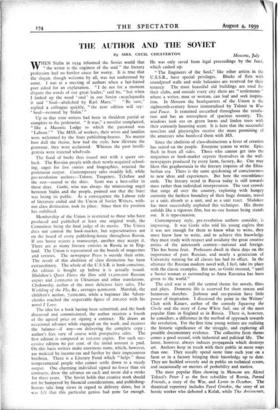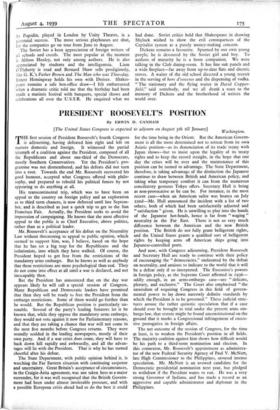THE AUTHOR AND THE SOVIET
By MRS. CECIL CHESTERTON
Moscow, 7:413, WHEN Stalin in '934 informed the Soviet world that " the writer is the engineer of the soul " the literary profession had no further cause for worry. It is true that the slogan, though welcome by all, was not understood by some. I was at a meeting of authors when a fair-haired poet asked for an explanation. " I do not for a moment dispute the words of our great leader," said he, " but when I looked up the word soul' in our Soviet encyclopaedia it said Soul—abolished by Karl Marx.' " " Be sure;' replied a colleague quickly, " the next edition will say: Soul—restored by Stalin.' " Up to that time writers had been in thraldom partial or complete to the proletariat. " It was," a novelist complained, " like a Masonic Lodge to which the password was Labour.' " The MSS. of workers, their wives and families were welcomed by the State publishing-houses. No matter how dull the theme, how bad the style, how illiterate the grammar, they were acclaimed. Whereas the poor intelli- gentsia were rejected wholesale.
The flood of books thus issued met with a queer set- back. The Russian people with their newly-acquired school- ing, eager for live stories and biographies, rejected the proletariat output. Contemporary sales steadily fell, while pre-revolution authors—Tolstoi, Turgenev, Tchehov and the rest—soared to the skies. Scott was a best-seller in those days. Gorki, who was always the ministering angel between Stalin and the people, pointed out that the State was losing its public. As a consequence the Labour rule of literature ended and the Union of Soviet Writers, with- out class distinction, took its place. Since then. the position has stabilised.
Membership of the Union is restricted to those who have produced and published at least one original work, the Committee being the final judge of its merits. The Unioa does not control the book-market, but representatives are on the board of every publishing-house throughout Russia. If one house rejects a manuscript, another may accept it. There are as many literary coteries in Russia as in Eng- land. The Union is represented on the boards of magazines and reviews. The newspaper Press is outside their orbit. The result of this abolition of class distinction has been extraordinary. The whole of the U.S.S.R. is book-conscious. An edition is bought up before it is actually issued. Sholokov's Quiet Flows the Don sold r i,000,000 Russian copies and 2,000,000 in Ukrainian and other translations. Chukowsky, author of the most delicious fairy tales, The Wedding of the Fly, &c., averages 9,000,000. Marshak, the children's author, 7,000,000, while a beginner like kdven- chenko reached the respectable figure of 200,000 with his novel I Love.
The idea for a book having been submitted, and the book discussed and commissioned, the author receives a fourth of the agreed price on signing a contract. He draws an occasional advance while engaged on the work, and receives the balance—if any—on delivering the complete copy ; author's fees vary of course with prospective sales. The first edition is computed at oo,000 copies. For each suc- cessive edition 6o per cent. of the initial amount is paid. On this basis writers make enormous sums, which, however, are mulcted by income-tax and further by their impecunious brethren. There is a Literary Fund which " helps " those temperamental people who cannot settle down to a steady output. One charming individual signed no fewer than six contracts, drew the advance on each and never did a stroke for three years. The Soviet holds that creative work should not be hampered by financial considerations, and publishing- houses take long views in regard to delivery dates, but it was felt that this particular genius had gone far enough. He was only saved from legal proceedings by the fund, which cashed up.
" The Engineers of the Soul," like other artists in the U.S.S.R., have special privileges. Blocks of flats with soundproof walls and wide balconies are reserved for their tenancy. The most beautiful old buildings are used for their clubs, and outside every city there are " settlements " where a writer, man or woman, can loaf and seek inspira- tion. In Moscow the headquarters of the Union is the eighteenth-century house immortalised by Tolstoi in War and Peace. It remained unscathed throughout the revolu- tion and has an atmosphere of spacious serenity. The windows look out on green lawns and linden trees with their curiously haunting scent. It is here that the successful novelists and playwrights receive the more promising of the amateurs who bombed them with MS.
Since the abolition of class-distinctions a fever of creation has. seized on the people. Everyone yearns to write. Epics flock in from all sides. Those who cannot get into the magazines or book-market express themselves in the wall- newspapers produced by every farm, factory, &c. One may liken this graphomania to the literary impetus of the Eliza- bethan era. There is the same quickening of consciousness to new ideas and experiences. But here the resemblance ends. The literary trend in Russia today is still towards mass rather than individual interpretation. The vast crowds that surge all over the country, exploring with hungry curiosity the farthest boundary of their huge domain, travel as a unit, absorb as a unit, and as a unit react. Sholokov has most successfully exploited this technique. His theme unfolds like a vigorous film, but no one human being stands out. It is type-creation.
Contemporary style, pre-revolution authors consider, is improving. It was Gorki who told his young eaglets that it was not enough for them to know what to write, they must know how to write, and to achieve this knowledge they must study with respect and assiduity the great creative artists of the nineteenth century—national and foreign. This has borne fruit. Professors dwell in these days on the importance of pure Russian, and nearly a generation of University training for all classes has had its effect. In the ultimate the Russian modern novel will, I feel, take its place with the classic examples. But not, so Gorki insisted, " until a Soviet woman as outstanding as Anna Karenina has been given to the world."
The civil war is still the central theme for novels, films and plays. Domestic life is reserved for short stories and humorous sketches. Jealousy and sex-passion have little power of inspiration. I discussed the point in the Writers' Club with Kataev, author of the comedy Squaring the Circle and the story of Lone White Sail, one of the most popular films in England as in Russia. There is, however, he considers, a difference in the method of approach towards the revolution. For the first time young writers are realising the historic significance of the struggle, and exploring all possible documentary evidence. The collective farm theme comes a•good second, with industrial and political life. The latter, however, always induces propaganda which destroys art. Authors keep in touch with their public in- more ways than one. They usually spend some time each year on a farm or in a factory bringing their knowledge up to date. They are heckled severely and in public on technical errors, and occasionally on matters of probability and motive.
The most popular films showing in Moscow are Alexd Tolstoi's Peter I as the first rebuilder of Russia, Parted Friends, a story of the War, and Lenin in October. The theatrical repertory includes Pavel Griokiv, the story of an heroic worker who defeated a Kulak, while The Aristocrats, by Pogodin, played in London by Unity Theatre, is a perennial success. The more serious playhouses are shut, for the companies go on tour from June to August.
The Soviet has a keen appreciation of foreign writers of all schools and creeds. The most popular at the moment is Aldous Huxley, not only among authors. He is also appreciated by students and the intelligentsia. Liam O'Flaherty is read and Bernard Shaw sells prodigiously, like G. K's Father Brown and The Man who was Thursday. Ernest Hemingway holds his own with Dreiser. Shakes- peare remains a safe box-office draw—I felt embarrassed when a dramatic critic told me that the birthday had been made a matinee festival with banquets, special shows and celebrations all over the U.S.S.R. He enquired what we had done. Soviet critics hold that Shakespeare in drawing Shylock wished to show the evil consequences of the Capitalist system as a purely money-making concern.
Dickens remains a favourite. Spurned by our own young people, he is devoured by the Soviet girl and boy. To authors of maturity he is a boon companion. We were talking in the Club dining-room. It has fine oak panels and a wide fireplace—far away from up-to-date flats and electric stoves. A waiter of the old school directed a young recruit in the serving of hors d'oeuvres and the dispensing of vodka. " The stationary and the flying waiter in David Copper- field," said somebody, and we all drank a toast to the memory of Dickens and the brotherhood of writers the world over.









































 Previous page
Previous page